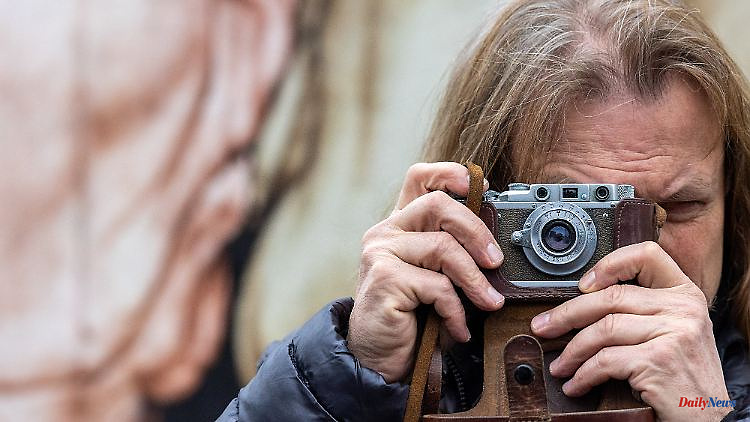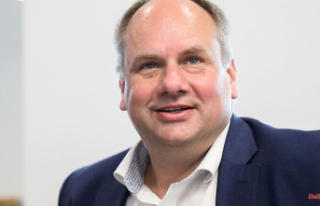Musician, rebel, optimist, father, husband, friend, bridge builder, forever young: this is how you could describe Leslie Mandoki in a few words. If you have a little more time, then there is also a little more to say about the man who is now turning 70 and feels like 30. A flourish.
We meet on the roof of a hotel in Berlin, where he always stays when he's in the capital. The view is amazing, it's just before Christmas and somehow there's something peaceful in the air. But it can also be quite possible that this is the effect of my interlocutor, because he always has something good up his sleeve: Leslie Mandoki sees the world through the eyes of a child, I sometimes think. But that wouldn't do him justice, because Mandoki is everything but childishly naive. But just as curious - about life, about people, about music.
Can't believe this man is turning 70 now. "I don't feel that way," he says. I believe him immediately, because the program he puts on is not that of a typical 70-year-old. But what is typical 70? And what is typical of Leslie Mandoki? "By the way, I'm not just turning 70," he laughs at me and continues in his inimitable Bavarian-Hungarian way: "My Red Rock Studio is turning 40 and my band, the Soulmates, is turning 30." That's true, and when Leslie Mandoki celebrates a big party in Munich on January 7 - "finally back to Corona" - the friends don't just come to celebrate the birthday of the former Dschinghis Khan band member.
Among the friends could be great musicians like Lionel Richie, Phil Collins, Udo Lindenberg ("I'm glad to be part of his colorful republic"), Chris Thompson (Manfred Mann's Earth Band), Bobby Kimball (Toto), John Helliwell (Supertramp) , his mentor Klaus Doldinger or Till Brönner. Economy, politics, art, culture - Leslie Mandoki has friends throughout society, in Germany and all over the world. He is a bridge builder. Speaking of the bridge, his neighbor from Lake Starnberg, Maffay Peter, "also an immigrant like me", will certainly stop by at the birthday party.
They all come because this man is so incredibly likeable, because one - and woman - simply likes to be around him, and because he has achieved something that unfortunately very few achieve: building a career under less than favorable starting conditions. He's flirting with that a bit, and at the same time he really means it when he says that people helped him back then and he's still grateful to this day. They asked what he wanted to be, he said: musician, and then he became a musician. He's "a little proud" of that. And wishes that those who arrive in Germany today could be helped more individually. He was on the border with Ukraine when the war started, and he never tires of quoting his old friend Gorbachev, who said that he would rather have 1,000 fruitless hours of negotiation than a single death. It's the only time Mandoki seems a bit perplexed when asked about the Ukraine war.
When he came to Germany as a young man, he did so because he had promised his father that his grandchildren would grow up in freedom and without censorship. Of course, Mandoki didn't just come to Germany like that, he fled. At the time, his home country Hungary was not what he had imagined for his future. He was 22 when he and two friends fled from what was then Yugoslavia to Austria and from there to Germany on foot through the Karawanken Tunnel. They came to a central camp for asylum seekers near Stuttgart. He remembers that he fell in love with the country back then and that he came back after a professional phase in America so that his three children, who are now adults, can grow up in Germany.
Leslie Mandoki is a loyal soul, there is no other way to put it: Married to the doctor Eva for decades, always interested in the lives and stories of the others, I now have to ask him what it is like to turn 70, because there is no alternative if you don't want to be dead: "It's just unbelievable how quickly time flies. It seems to me that I'm still in my 30s." And indeed, it seems as if he rocks the stage effortlessly for hours: his tour starting in September has no breaks between performances.
So maybe a lot of work and a love of music are the keys to a long life? "I know it sounds like I'm showing off, but I have the same energy as I used to. It hasn't changed that much." In addition, the man with the iconic Dschinghis Khan mustache is in excellent health - he has never been to the dentist (!) - and he loves to go canoeing: on his beloved Lake Starnberg or near his childhood home in Hungary, where he paddles on the Danube.
Mandoki was back in Budapest last year after a long break with his Soulmates, Open Air, and with some world stars at his side. Playing in his old homeland means a lot to him: "I will always be connected to my country of birth, and of course I can't ignore the fact that things are complicated between the Germans and the Hungarians." But he finds disputes constructive and ultimately hopes for a solution that creates a consensus in society. In any case, he, the old rebel, is ready for discussions and further musical ideas.
What's most exciting about Leslie Mandoki? In addition to the decades-long career, for which he is very grateful, his eternal optimism of wanting to make the world a better planet is striking. Away from greed towards more mindfulness. Mandoki would have fit in well at Woodstock, but although he wasn't there, he still believes in the utopia of a positive, peaceful revolution. During a conversation we had during the Corona period, there must have been a time window between the first and second lockdown, he was concerned that society was becoming more and more divided and that the egomaniacs were making it impossible for the tolerant to get along with each other to live. With his music he tries again and again to prevent the division of society. Values are important to him - something he appreciates so much about his adopted home of Germany.
What would Leslie Mandoki wish for her birthday besides peace, a decent water level in Lake Starnberg and working paddles? Mandoki may be an optimist, but he is also an eternal rebel. That's why he is of the opinion that musicians - and well-known people in general - should draw attention to grievances. "We all have to rebel a lot more," he wishes. By that he doesn't mean sticking himself to freeway exits or throwing tomato sauce at works of art. And that's why he loves his soulmates so much: Not only because they are fantastic musicians from successful bands, but because they are colorful individuals, of every skin color, every origin, every age, who provide the necessary light at the end of the tunnel. What they have in common is the music. We should all become musicians! And rebels.












